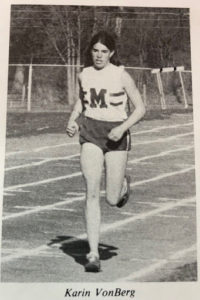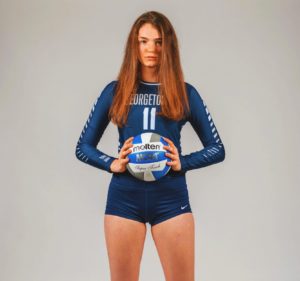by Ellie Greeneberg
Two women, Tracey Thompson Turner and Karin Von Berg Noyes, created the first women’s track and field team at Middlebury College. Tracey Thompson Turner was the very first women’s track and field athlete at Middlebury College. She has held the school’s 100m record for over 42 years. Karin Von Berg Noyes was Middlebury’s first female All-American and ran the 3,000m and the 5,000m. Each talks about their pioneering effort and experiences in sport.
Tracey Thompson Turner
When did you first begin running and when did you know that you were good at it?
I was introduced to running by my dad because he was a runner. In middle school, we had races on the playground and I always won those races—often beating the boys. When I was little, I just always loved to run and would run rather than walk wherever I went. I was competitive right from the beginning and always happy to race anybody who wanted to.
When you arrived at Middlebury College, there was no formal women’s track team?
Not at all. No. It was just the men’s team. And so I said I guess I’m going to run with the men. Even though I was a sprinter, I learned to nordic ski in the winter and ran cross country in the fall to keep my fitness up.
So, I ran with the boys. And I would even beat a couple of the football players at practice. They didn’t like that!
How did the coaches and the other men on the team react to your presence?
They were all wonderful: welcoming and enthusiastic about me being there. I never felt like I didn’t belong there.
And the only reason we started the women’s team was when Karin came and now there were two of us that could go to actual meets and compete against other women. We would go in a rental car and show up and compete.
Title IX was really just getting going and was the impetus behind our ability to start the track team at Middlebury College.
What were some challenges that you faced pioneering the women’s track team?
The biggest challenges were the equipment, or lack thereof. We just did not have the kind of facilities that Middlebury has today. The weight room was a teeny little room. At that time, women just weren’t educated about using weights or strength training. My boyfriend was a football player, and he was the one who got me working out and lifting weights at a time when women just didn’t really do that.
Back home, I would go to these gyms and the guys would be like, “what is she doing in here?” but I never really let it faze me. I was just used to it.
Are there any life lessons you learned from running that you still carry with you?
Absolutely. So much of being successful in athletics is mental. It’s making up your mind that you’re going to do this thing. And even if it’s painful, or if the weather’s bad, or whatever these minor inconveniences may be, you can still persevere if your heart and your head is in it.
You just know that if you can dig down deep enough, you can do it. And that has continued with me in my life, that you just have to really do the mental work to get through difficult times.
I started to struggle with my knees and I had a really hard time giving up running because it was so much a part of me. I ran a lot longer than I should have, but I just kept doing it because I got so much joy out of it.
That’s the other thing. Even with the sacrifices that you sometimes have to make and the pain that you sometimes feel, there’s the basic joy in it or else you wouldn’t do it. If you didn’t love it, you wouldn’t do it. You could think of so many reasons to get out of it if you really didn’t like and love what you were doing. The life lesson is being quite true to yourself. Really asking yourself, “do I want to do it? Is my heart in it? Is my head in it?” And if the answer to those things is yes, then you can be successful.
TVP promotes mental wellness in female athletes. Could you talk about the relationship between your sport and your mental well-being?
They’re very much integrated together. When you are an athlete and you’re strong physically, that can sometimes translate to a mental strength. As an athlete, you’re constantly having to take care of yourself mentally in order to be able to compete physically.
Building a support network for yourself is very important to that mental well-being because you can’t do it all by yourself. If you have someone in your life who’s not supportive, that makes it that much more difficult.
Also, being a woman athlete, I identify as a physically strong person and that is good for my mental health because I just feel very confident in my body image. Sports gives you a certain confidence that is so much a part of the person I am.
What else is important for you to share?
I do feel sports are really empowering. Whether you’re good at it or not, you’re still putting yourself out there and you’re trying to do your very best. That is really an important lesson for people but particularly for women. Sports are wonderfully empowering for women. I wish every woman would have that experience. It has really shaped my life in a very positive way, and I certainly wouldn’t trade it for the world.
You have to do a lot of soul-searching and digging deep in sports, and that is a very valuable thing for people to have and for women, in particular, and to have that confidence that comes from both success and failure in sports.

Karin Von Berg Noyes
When did you know running was something you wanted to do and something you were good at?
As a kid, running came very easily to me because I did it all the time. In middle school we had a fitness test run, and I would always be right up with the boys and maybe even beat them. It was the really early days of women’s sports and a high school track team was just forming. It was so much fun to compete because almost every time I ran a race, I broke a record because it was just so early in the game for women.
I spent my first semester at the University of New Hampshire and there were no women’s sports at all so I ran with the men. Running was so much a part of my identity, and I didn’t want to stop just because there was no women’s team.
I met Tracey when I transferred to Middlebury College. There were enough women on the team at that point to form a relay.
What was it like to be a female athlete at Middlebury at that time?
Middlebury had established men’s sports already and people looked up to the athletes, especially the skiers. I was also on the nordic ski team to work on my endurance. Even though there were not a lot of female athletes, we were respected. It was a big boost to my confidence that I could be a skier and a runner.
It was very easy for me to run and train with the men, and it pushed me because I had someone strong to train with. But I think some of my female teammates who were not as comfortable training at that level on the cross-country team felt overlooked as a female athlete.
Overall, Middlebury College was super supportive of us. I feel we were embraced by bringing women’s sports, this new thing into being.

What connection does your mental health and well-being have with your sport?
Oh my goodness. I depended on my sport for my well-being.
Running definitely made me into a happier person. Running was very much my identity and once I was out of college I had to figure out who I really was outside of it. It’s allowing yourself room to find out who you are besides the athlete, that’s an important step in growing up.
Even though I am not competing anymore, I go for a walk or get outside everyday. I think that comes from so many years of being driven to to work out every day. If I don’t do that every day, I don’t feel complete. I love getting outside and just being outside in nature, but moving is what makes me feel the healthiest.
What life lessons do you think your sport taught you?
I loved being captain of the team because I enjoyed encouraging other people to run and compete and do their best. I loved to compete, encourage others to do their best, have mutual respect, and share a goal that we were all working towards.
What advice would you give to a young female athlete today?
Enjoy it. If you’re not finding some kind of enjoyment in the pursuit of your event or sport, you might want to re-evaluate why you’re doing it. Because, I loved running and I loved running fast. Honestly, I loved winning. So if you’re doing it and you’re not finding some kind of joy in it, maybe you want to re-evaluate. Look for the joy.


